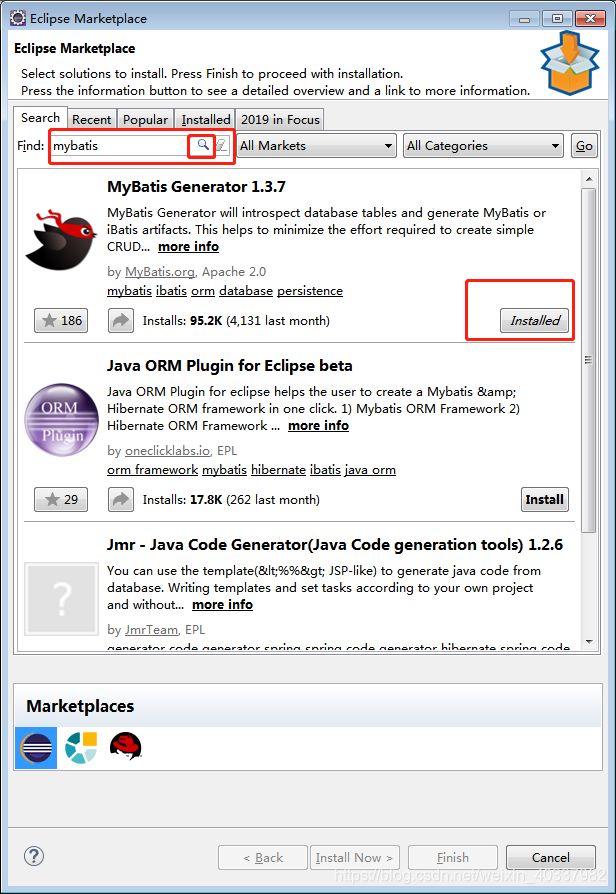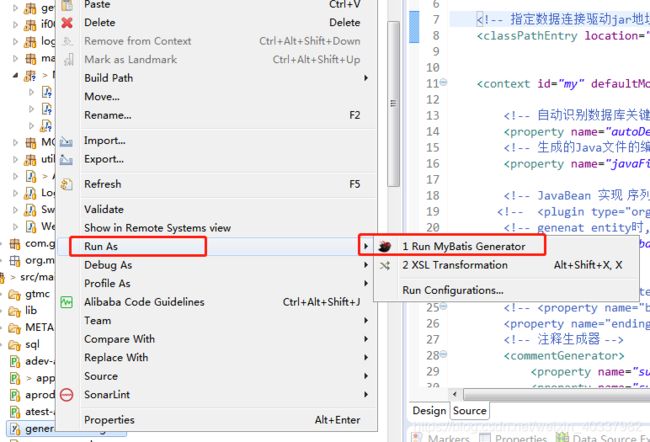使用mybatis自动生成—generatorConfig配置文件
spring boot 使用mybatis自动生成方法:
首先pom.xml添加依赖:
org.mybatis.generator
mybatis-generator-core
1.3.5
在build—>plugins下面添加:
org.mybatis.generator
mybatis-generator-maven-plugin
1.3.5
接下来是mybatis自动生成的配置文件:
mysql配置:
Oracle配置:
这是要注意一下,
使用Oracle数据库的时候,需要重写两个类,因为oracle里的nvachar2类型,mybatis无法识别,会转换成object类型;
package org.mybatis.generator.internal.types;
import java.sql.Types;
import org.mybatis.generator.api.dom.java.FullyQualifiedJavaType;
public class MyJavaTypeResolverDefaultImpl extends JavaTypeResolverDefaultImpl{
public MyJavaTypeResolverDefaultImpl() {
super();
//把数据库的 NVARCHAR2 映射成 String
super.typeMap.put(Types.OTHER, new JdbcTypeInformation("NVARCHAR2", new FullyQualifiedJavaType(String.class.getName())));
}
}
第二个是IntrospectedColumn,我这里直接贴源码;
/**
* Copyright 2006-2016 the original author or authors.
*
* Licensed under the Apache License, Version 2.0 (the "License");
* you may not use this file except in compliance with the License.
* You may obtain a copy of the License at
*
* http://www.apache.org/licenses/LICENSE-2.0
*
* Unless required by applicable law or agreed to in writing, software
* distributed under the License is distributed on an "AS IS" BASIS,
* WITHOUT WARRANTIES OR CONDITIONS OF ANY KIND, either express or implied.
* See the License for the specific language governing permissions and
* limitations under the License.
*/
package org.mybatis.generator.api;
import java.sql.Types;
import java.util.Properties;
import org.mybatis.generator.api.dom.java.FullyQualifiedJavaType;
import org.mybatis.generator.config.Context;
import org.mybatis.generator.internal.util.StringUtility;
/**
* This class holds information about an introspected column. The class has
* utility methods useful for generating iBATIS objects.
*
* @author Jeff Butler
* update wangxinyang 20190123
*/
public class IntrospectedColumn {
protected String actualColumnName;
protected int jdbcType;
protected String jdbcTypeName;
protected boolean nullable;
protected int length;
protected int scale;
protected boolean identity;
protected boolean isSequenceColumn;
protected String javaProperty;
protected FullyQualifiedJavaType fullyQualifiedJavaType;
protected String tableAlias;
protected String typeHandler;
protected Context context;
protected boolean isColumnNameDelimited;
protected IntrospectedTable introspectedTable;
protected Properties properties;
// any database comment associated with this column. May be null
protected String remarks;
protected String defaultValue;
/**
* true if the JDBC driver reports that this column is auto-increment
*/
protected boolean isAutoIncrement;
/**
* true if the JDBC driver reports that this column is generated
*/
protected boolean isGeneratedColumn;
/**
* True if there is a column override that defines this column as GENERATED ALWAYS
*/
protected boolean isGeneratedAlways;
/**
* Constructs a Column definition. This object holds all the information
* about a column that is required to generate Java objects and SQL maps;
*/
public IntrospectedColumn() {
super();
properties = new Properties();
}
public int getJdbcType() {
return jdbcType;
}
public void setJdbcType(int jdbcType) {
this.jdbcType = jdbcType;
}
public int getLength() {
return length;
}
public void setLength(int length) {
this.length = length;
}
public boolean isNullable() {
return nullable;
}
public void setNullable(boolean nullable) {
this.nullable = nullable;
}
public int getScale() {
return scale;
}
public void setScale(int scale) {
this.scale = scale;
}
/*
* This method is primarily used for debugging, so we don't externalize the
* strings
*/
@Override
public String toString() {
StringBuilder sb = new StringBuilder();
sb.append("Actual Column Name: "); //$NON-NLS-1$
sb.append(actualColumnName);
sb.append(", JDBC Type: "); //$NON-NLS-1$
sb.append(jdbcType);
sb.append(", Nullable: "); //$NON-NLS-1$
sb.append(nullable);
sb.append(", Length: "); //$NON-NLS-1$
sb.append(length);
sb.append(", Scale: "); //$NON-NLS-1$
sb.append(scale);
sb.append(", Identity: "); //$NON-NLS-1$
sb.append(identity);
return sb.toString();
}
public void setActualColumnName(String actualColumnName) {
this.actualColumnName = actualColumnName;
isColumnNameDelimited = StringUtility
.stringContainsSpace(actualColumnName);
}
/**
* @return Returns the identity.
*/
public boolean isIdentity() {
return identity;
}
/**
* @param identity
* The identity to set.
*/
public void setIdentity(boolean identity) {
this.identity = identity;
}
public boolean isBLOBColumn() {
String typeName = getJdbcTypeName();
return "BINARY".equals(typeName) || "BLOB".equals(typeName) //$NON-NLS-1$ //$NON-NLS-2$
|| "CLOB".equals(typeName) || "LONGNVARCHAR".equals(typeName) //$NON-NLS-1$ //$NON-NLS-2$
|| "LONGVARBINARY".equals(typeName) || "LONGVARCHAR".equals(typeName) //$NON-NLS-1$ //$NON-NLS-2$
|| "NCLOB".equals(typeName) || "VARBINARY".equals(typeName); //$NON-NLS-1$ //$NON-NLS-2$
}
public boolean isStringColumn() {
return fullyQualifiedJavaType.equals(FullyQualifiedJavaType
.getStringInstance());
}
public boolean isJdbcCharacterColumn() {
return jdbcType == Types.CHAR || jdbcType == Types.CLOB
|| jdbcType == Types.LONGVARCHAR || jdbcType == Types.VARCHAR
|| jdbcType == Types.LONGNVARCHAR || jdbcType == Types.NCHAR
|| jdbcType == Types.NCLOB || jdbcType == Types.NVARCHAR;
}
public String getJavaProperty() {
return getJavaProperty(null);
}
public String getJavaProperty(String prefix) {
if (prefix == null) {
return javaProperty;
}
StringBuilder sb = new StringBuilder();
sb.append(prefix);
sb.append(javaProperty);
return sb.toString();
}
public void setJavaProperty(String javaProperty) {
this.javaProperty = javaProperty;
}
public boolean isJDBCDateColumn() {
return fullyQualifiedJavaType.equals(FullyQualifiedJavaType
.getDateInstance())
&& "DATE".equalsIgnoreCase(jdbcTypeName); //$NON-NLS-1$
}
public boolean isJDBCTimeColumn() {
return fullyQualifiedJavaType.equals(FullyQualifiedJavaType
.getDateInstance())
&& "TIME".equalsIgnoreCase(jdbcTypeName); //$NON-NLS-1$
}
public String getTypeHandler() {
return typeHandler;
}
public void setTypeHandler(String typeHandler) {
this.typeHandler = typeHandler;
}
public String getActualColumnName() {
return actualColumnName;
}
public void setColumnNameDelimited(boolean isColumnNameDelimited) {
this.isColumnNameDelimited = isColumnNameDelimited;
}
public boolean isColumnNameDelimited() {
return isColumnNameDelimited;
}
public String getJdbcTypeName() {
if (jdbcTypeName == null || jdbcTypeName.equalsIgnoreCase("NVARCHAR2")) {
return "OTHER"; //$NON-NLS-1$
}
return jdbcTypeName;
}
public void setJdbcTypeName(String jdbcTypeName) {
this.jdbcTypeName = jdbcTypeName;
}
public FullyQualifiedJavaType getFullyQualifiedJavaType() {
return fullyQualifiedJavaType;
}
public void setFullyQualifiedJavaType(
FullyQualifiedJavaType fullyQualifiedJavaType) {
this.fullyQualifiedJavaType = fullyQualifiedJavaType;
}
public String getTableAlias() {
return tableAlias;
}
public void setTableAlias(String tableAlias) {
this.tableAlias = tableAlias;
}
public Context getContext() {
return context;
}
public void setContext(Context context) {
this.context = context;
}
public IntrospectedTable getIntrospectedTable() {
return introspectedTable;
}
public void setIntrospectedTable(IntrospectedTable introspectedTable) {
this.introspectedTable = introspectedTable;
}
public Properties getProperties() {
return properties;
}
public void setProperties(Properties properties) {
this.properties.putAll(properties);
}
public String getRemarks() {
return remarks;
}
public void setRemarks(String remarks) {
this.remarks = remarks;
}
public String getDefaultValue() {
return defaultValue;
}
public void setDefaultValue(String defaultValue) {
this.defaultValue = defaultValue;
}
public boolean isSequenceColumn() {
return isSequenceColumn;
}
public void setSequenceColumn(boolean isSequenceColumn) {
this.isSequenceColumn = isSequenceColumn;
}
public boolean isAutoIncrement() {
return isAutoIncrement;
}
public void setAutoIncrement(boolean isAutoIncrement) {
this.isAutoIncrement = isAutoIncrement;
}
public boolean isGeneratedColumn() {
return isGeneratedColumn;
}
public void setGeneratedColumn(boolean isGeneratedColumn) {
this.isGeneratedColumn = isGeneratedColumn;
}
public boolean isGeneratedAlways() {
return isGeneratedAlways;
}
public void setGeneratedAlways(boolean isGeneratedAlways) {
this.isGeneratedAlways = isGeneratedAlways;
}
}
重写的上面这个类,重点在这里:
到这里配置文件就ok了;
-------------------------------------------------------------
在里面配置好数据源,表名,要生成的类名,然后就可以使用了;
对了,这里eclipse还要安装一个插件:
在eclipse的菜单栏点击 help—>Eclipse Marketplace ...
然后在search选项卡中搜索:mybatis
右下角的install,直接安装就好了。
我这里因为是已经安装过的,所以显示installed;
安装成功之后,在我们的generatorConfig.xml上点击右键:Run As
运行之后,控制台会打印日志,可以查看日志看是否生成成功,成功之后会在上面配置的包下面生成文件。
-------------------------------
还可以使用mybatis-plus的插件,这个配合相应的模版,能生成更多的文件诸如增删改查,从dao到controller都会有相关方法,更加便捷。
有兴趣可以探索一下。
程序员都是懒人,因为懒,所以我们在做一件事情的时候,会去寻找一更优的解决方案。
不将就,the end;



